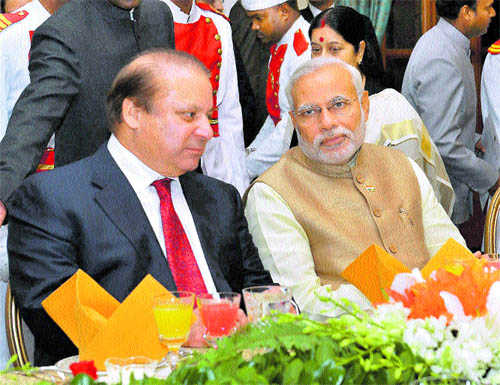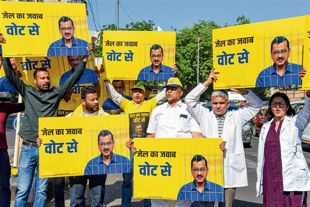
Grasping at straws: Despite efforts, the talks are not getting anywhere.
S Nihal Singh
THE Indo-Pakistan talks are, more often than not, playing blind man’s buff. The point about New Delhi inviting Pakistan’s foreign secretary Aizaz Ahmad Chaudhry for a meeting with his Indian counterpart S Jaishankar was to start the process of talking all over again. The outcome was in keeping with low expectations as became clear from the recital of well-worn themes by the two sides: stop terror and the centrality of Kashmir.
There are interesting nuances though to this meeting of the two foreign secretaries, the first since the Pathankot attack. First, Prime Minister Narendra Modi’s dramatic stopover in Lahore last Christmas to meet Mr Nawaz Sharif soon yielded place to relations taking a dip. This week’s talks sought to give a push to keeping a conversation going. And the Pathankot attack prompted Islamabad to countenance the Pakistani origin of the attackers although the visit of its team to the scene of the crime has led to the usual inspired leaks.
The Delhi talks produced the familiar narratives, and the Pakistanis this time had an alleged Indian spy to spice their version of events. The resonance of the two countries’ relations on their peoples being what it is, neither side can stray from the script. Is it then a ruse accepted by the two sides to hold secret talks behind the facade of the usual name-calling to arrive at a compromise?
The contours of the policies of the two unfriendly neighbours are well known. Kashmir has acquired an almost surrealistic quality for Pakistanis because their leaders have been telling them since Partition that it was “stolen” by India after attempts to acquire it by force through irregular and regular troops failed. The policy then employed by a succession of Pakistani rulers was to bleed India through a thousand cuts.
It does not take a Sherlock Holmes to discover that terrorists, with the connivance of the Pakistani authorities, are nurtured, trained and equipped by organisations such as the Lashkar-e-Taiba and Jaish-e-Mohammed, the latter under Masood Azhar, to commit murder and mayhem in India. In course of time Islamabad had to grapple with the problem of separating ‘good terrorists’ from ‘bad’ because the latter variety was going after the Pakistani power structure.
There was another twist to the Pakistan story because, especially in the reign of Mr Sharif, the army had tightened its grip on foreign and security policies, particularly in relations with India, China and the US, and on the key to the bomb. Given its history, the army has been a power factor after the early deaths of the iconic Muhammad Ali Jinnah and his successor Liaquat Ali Khan. It consolidated its power after the sad end of the showman Zulfikar Ali Bhutto, particularly during the present ostensibly civilian regime.
In India, the coming to power of Mr Modi represented a break from the past. The last years of the UPA-II were problem-ridden, with Prime Minister Manmohan Singh beholden to his own party chief and demanding coalition partners. Ironically, despite his emotional attachment to his former home in Pakistan, he could not make a single visit to the neighbouring country in his 10 years in office.
Hopes were high at one time on both sides that Mr Modi, as the head of an ultra-nationalist party enjoying a majority government, could make a new opening in traditionally stalled relations. The analogy, of course, was that it needed a Richard Nixon to make peace with Communist China. He invited Mr Sharif, among other neighbouring leaders, to his swearing in, and when after a time, talks were stalled in a familiar quagmire, he took the daring step of greeting Mr Sharif in his Lahore home.
Pathankot followed, as if on cue, to stymie the upswing in relations —nothing like a terror attack to bring back the familiar rhetoric on the two sides. But one interesting difference this time was that Islamabad did not dismiss Pakistani provenance in the attack. So the question remains: where do the two sides go from here? The simple answer New Delhi came up with was to resume talking under the cover of a high-level conference on Afghanistan.
Unfortunately, the device of the national security advisers (NSAs) of the two countries forming another channel of communication does not seem to be working. For New Delhi, it had the benefit of keeping the Pakistan army in the loop because its NSA is a retired general. But apart from breaking the ice through a meeting in Thailand, the two NSAs are repeating the narrative of the political channel.
Efforts in the past to open a separate secret official channel led to interesting ideas being thrown up, but in the end they could not stand the test of working through the bureaucracy of the two countries to reach the top to be converted into negotiating positions. If the two sides do not use talks they may have in future as a camouflage for real discussions, there is little prospect of a beginning to the end of a long process of reconciliation.
The world is littered with unresolved problems between countries left over by history and passionate debates. The subcontinent’s Partition was a great human tragedy while bringing freedom. Pakistanis have the more difficult task of reconciling with India because they have not quite decided what the shape and goals of their country should be. Islamabad also has an ideological problem, with the Muslim world in the Middle East seething in ferment and extremist tendencies coming to the fore. The moderate Pakistani, particularly among the professional and middle classes, might be in a minority but it is a significant minority.
The Modi government’s attempt seems to be to test the limits of Pakistan’s existing juxtaposition of forces in an effort to keep the conversation process going — to “keep in touch”, according to the official script. The terrorists have the advantage of springing a surprise.



























